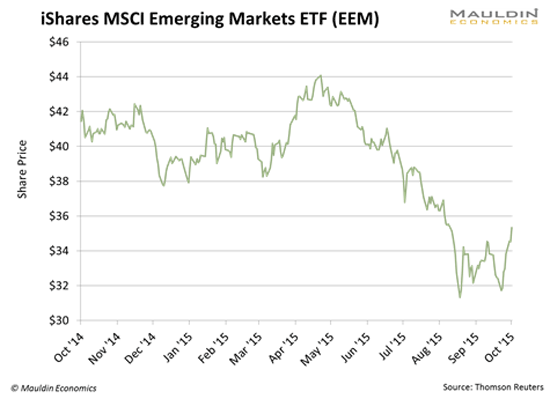I was going to give you this big macro rundown of what happened since the payroll number, but I changed my mind. Anybody can give you the play-by-play. Let’s talk about it in the context of true contrarian investing.
Being contrarian doesn’t just mean doing the opposite of what everyone else is doing. It means doing what is really unpopular and may make you subject to ridicule.
If you went on CNBC before the payroll number and said that you were a raging emerging markets bull, they would have put the clown nose on you and given you the hook.
And yet…

This may not seem like a big deal to you. If you are an individual investor, you can have the iShares MSCI Emerging Markets Index ETF (EEM) in your portfolio and lose money on it, and the only one who cares is you.
But if you run a mutual fund or a hedge fund, you have to file a 13F and then everyone can see EEM in your portfolio, and you have to explain to your investors why you have this dumb EEM position that everyone hates and that’s obviously going down—and if you lose money on indefensible things, it becomes difficult to defend your continued employment.
For example, if Nike (NKE) were to miss earnings and gap lower 15%, nobody would get fired, because everyone owns it.
But if you go down with the emerging markets ship, you are definitely getting fired.
So being a contrarian is hard if you’re a professional, because if you are wrong, you are wrong publicly, and you experience shame, and as we said before, shame is the most powerful motivator.
I did not pick up my moniker The 10th Man by accident. Do you know where it came from? It came from the zombie movie World War Z.
Spoiler alert: In the movie, Israel survived the zombie invasion because they employed a 10th man whose job it was to disagree when everyone else agreed. Israeli intelligence intercepted emails from India saying that they were being attacked by “undead,” literally, zombies.









Leave A Comment